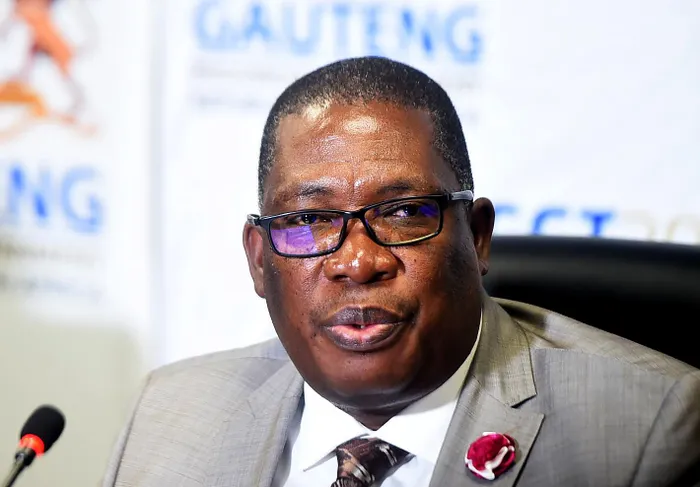Lesufi vows to demolish illegal informal settlements at 2am — ‘We’re tired of this’

Gauteng Premier Panyaza Lesufi during a media briefing in Johannesburg, where he announced plans to demolish illegal informal settlements at 2 a.m.
Image: Itumeleng English/Independent Newspapers
Gauteng Premier Panyaza Lesufi says the provincial government is planning to demolish illegal informal settlements with a focus on those occupied by undocumented foreign nationals.
Speaking at a media briefing in Johannesburg on Wednesday, following the Gauteng Executive Council (Exco), Lesufi expressed concern over the rapid growth of informal settlements in the province and stated that they would be demolished at 2 am.
Lesufi, however, did not specify on which day they will go to demolish those informal settlements. He revealed that more than 400 new informal settlements have recently emerged.
“Partnerships with municipalities will be strengthened, and proactive measures will be taken to halt further land invasions while ensuring lawful settlement development,” Lesufi said.
He said that there was a newly established informal settlement in Ennerdale, built over the weekend, as evidence of an emerging pattern.
“The pattern is clear: identify land owned by the government, send a few people, and after 72 hours, once there’s no eviction, invite everyone who needs land to occupy it,” he said.
“We are tired of this government now.”
Lesufi accused organised syndicates of occupying land illegally, charging people to settle there, and then demanding services from the government.
“If we have to meet in court, we’ll meet in court. But we are going to destroy those informal settlements,” he said.
Lesufi, an ANC member and co-convener in Gauteng, has been outspoken about undocumented foreigners, particularly arguing that they should not have access to public services.
“Once these settlements are established, people demand water, schools, school transport, sewerage and roads. We cannot continue diverting resources from law-abiding citizens to cater for illegal land grabs.”
He said that any unregistered and unauthorised informal settlements will be demolished.
“If there is an informal settlement that is not recognised, that is not registered, and we have not given it the go-ahead - as I’m saying now - we have resolved as a government that those informal settlements must be crushed.”
Lesufi said the government would try to engage affected individuals and ask them to vacate voluntarily, but if they refuse, authorities would act.
He also said that the majority of new settlements are occupied by undocumented foreign nationals.
“That’s the sad part. People who are not documented think they can just invade land and establish informal settlements without permission - then blame the government when they don’t have water. We’re not going to allow that.”
Lesufi confirmed that demolition operations would take place during the early hours of the morning.
“I told the team - we are going to dismantle these informal settlements at 2 a.m. I don’t want anyone there during the day. The patience of this government, and our people, has been abused.”
However, he did not specify which day they plan to demolish the informal settlements. He only mentioned 2 a.m, which is likely to be in the morning.
He added that the provincial operation would involve all municipalities and law enforcement agencies.
“If it’s in Ekurhuleni, we’re bringing in Johannesburg, Soweto, Sedibeng…all of them. All law enforcement agencies. One informal settlement at a time.”
Lesufi said that unlawful development would not be allowed to derail Gauteng’s growth.
“We can’t be taken back when we want to develop our province. We can’t allow people to think they can bypass proper processes because they are backed by syndicates.”
Speaking with IOL News, independent political analyst Goodenough Mashego has slammed Lesufi, accusing him of using the demolition of informal settlements to win support ahead of the 2026 local government elections.
Mashego said Lesufi is reacting to the growing influence of Operation Dudula, a grassroots group that’s become known for its tough stance against undocumented foreign nationals.
“Lesufi sees that Operation Dudula is very active in Gauteng, and they could seriously impact the elections,” Mashego said.
“They are on the ground, speaking directly to people who are frustrated about illegal immigration.”
Operation Dudula has made headlines for blocking undocumented migrants from accessing clinics and schools, saying they are adding pressure to already overstretched public services.
Mashego warned that if Dudula runs in the local government elections, they could attract a lot of support - especially with other parties like the Patriotic Alliance (PA) pushing the same “Ma bahambe” (they must go) message.
He also accused Lesufi of using government resources to push a similar agenda, just without using the same direct, inflammatory language.
“The ANC does not want to be seen using harsh anti-immigrant language, so they are using the organs of state to act instead,” Mashego said.
“But the law says you can’t evict people without giving them another place to stay. They might still go ahead if no one takes it to court.”
Lesufi’s comments come shortly after the IFP’s City of Johannesburg MMC for Human Settlements, Mlungisi Mabaso, made similar statements.
Speaking during a meeting with Freedom Park informal settlement leaders last week, Mabaso said the city will not use South African taxpayers’ money to service informal settlements primarily occupied by foreign nationals.
“If it’s more than 10,000 foreign nationals, we take taxpayers’ money and go provide services to them? That is not going to happen,” Mabaso said in a video circulating on social media.
“That will happen under another MMC - not while I am in office.”
Mabaso, also the IFP Youth Brigade’s national secretary, argued that Johannesburg’s resources are already overstretched and being misused.
“Our resources are already stretched, and they are being wasted.”
He further alleged that certain officials and law enforcement personnel were profiting by building structures in informal settlements and renting them out illegally.
Gauteng continues to face a growing housing and infrastructure crisis, with widespread service delivery backlogs, including power outages, water shortages, potholes, sewer overflows, and high levels of crime and lawlessness.
simon.majadibodu@iol.co.za
IOL Politics